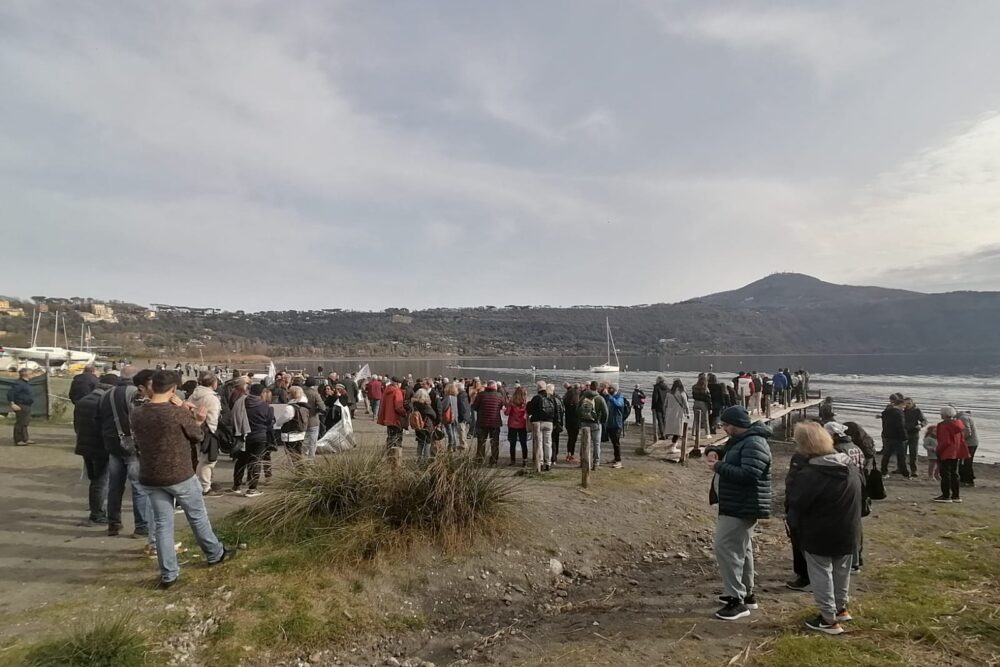Lake Albano and Lake Nemi face a serious water crisis caused by excessive withdrawals, urbanization and climate change. The WWF denounces the emergency and asks for urgent interventions to safeguard these ecosystems, fundamental for biodiversity and environmental stability of the Castelli Romani
In recent decades, the level of Albano lake It dropped by about seven meters, causing a loss of over 40 million cubic meters of water. The excessive exploitation of the aquifer, uncontrolled urbanization and climate change have aggravated this crisis.
Lake Nemi also undergoes a progressive lowering of the waters. The causes remain the same: indiscriminate withdrawals from the aquifer and an ineffective water management, unable to stem the failure.
To counteract this emergency, in January 2024 the district basin authority of the Central Apennines established a technical table. The works involve the local municipalities and the water manager Acea Ato2. The plan includes concrete actions: reduction of losses in pipelines and transfer of water resources from other basins. The interventions, however, will require at least two years before giving tangible results.
Targeted interventions
The water equilibrium of the Alban Hills lakes remains seriously compromised. Only constant monitoring and targeted interventions will avoid the risk of an irreversible environmental disaster.
“We need to put a brake on soil consumption -said Raniero Maggini, president of WWF Rome and metropolitan area -, iNvest in the modernization of distribution networks to counter water waste due to unacceptable losses of entities, rationalize both public and private withdrawals, with particular attention to the industrial and agricultural sectors. The drought cannot be systematically addressed by increasing the withdrawals but with urgent measures that guarantee the safeguarding of the water resource and the natural systems that depend on it “
The call of the WWF
In recent days, the WWF Rome and the metropolitan area has again attracted attention to the naturalistic importance of this area. The Albano and Nemi lakes, authentic jewels of the territory of the metropolitan city, fall within the protected perimeter of the Regional Natural Park of the Castelli Romani. The ongoing climate change therefore requires particular attention to the conservation and management of wetlands, which have always been considered biodiversity hotspots.
The WWF has long monitored small wetlands scattered throughout the territory. These ecosystems play a crucial role: they protect biodiversity and mitigate the effects of climate change. They collect rainwater during intense rainfall and release steam on torrid days, contrasting the phenomenon of the heat islands in urbanized areas.
A heartfelt appeal
On the occasion of the World Day of Wetlandshundreds of people participated in an event on the banks of Lake Albano. Over fifty associations have joined the event, underlining the urgency of concrete interventions.
The world day of wetlands is celebrated annually on February 2nd on the occasion of the anniversary of the adoption of the Convention on wetlands of international importance, signed in Ramsar (Iran) On February 2, 1971.
A heartfelt appeal emerges from an official note: without immediate measures, the water crisis that grips the lakes of the Castelli Romani will find no solution. Their drafting could take place more quickly than the theme is. The WWF will undertake to support any initiative capable of reversing this trend, so that this extraordinary natural heritage is not canceled by indifference.
«Leave dismayed to walk along the bank of the lake, first occupied by the water -concludes Maggini -; A incalculable damage that seriously puts a natural heritage at risk so important as to have been recognized by the regional legislator as a natural park. Recommended withdrawals in aquifer have led to the serious current conditions, on which today the effects of climate change and unsustainable choices that seem to want to still want to ignore the evidence are also weighing ».





